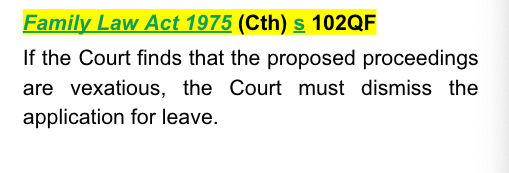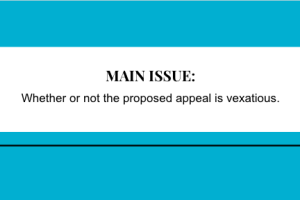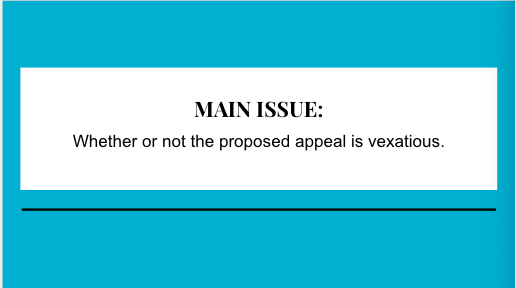- · 4776 friends
Applicant Appeals Orders of Prohibition to Institute Proceedings

Massalski (No 2) [2022] FedCFamC1A 167 (1 November 2022)
The applicant seeks leave to institute appeal proceedings against order made by the primary judge ordering the applicant to be prohibited from instituting proceedings in any court having jurisdiction under the act in relation to the respondent without first being granted leave. The Court, in resolving this dispute, assessed whether the appeal is vexatious.

Facts
By an Application in an Appeal filed on 6 September 2022, Ms Massalski (“the applicant”) seeks leave under s 102QE of the Family Law Act 1975 (Cth) (“the Act”) to institute appeal proceedings against orders made by a judge of the Federal Circuit and Family Court of Australia (Division 1) on 5 August 2022.
On that date, in proceedings between the applicant and Mr Riley (“the respondent”), the primary judge ordered, pursuant to s 102QB(2)(b) of the Act, that the “[the applicant] be prohibited from instituting proceedings in any court having jurisdiction under the Act in relation to [the respondent], without first having been granted leave to commence that proceeding pursuant to s 102QE of the Act” (Order 2).
A further order was made by the primary judge dismissing all extant applications that had been brought by the applicant (Order 1).
His Honour also appointed a receiver by way of enforcement over the income and property of the applicant to secure payment to the respondent pursuant to the provisions of Div 11.1.6 of the Federal Circuit and Family Court of Australia (Family Law) Rules 2021 (Cth).
The applicant has filed an affidavit and written submissions in support of her application as well as a proposed Notice of Appeal.
The respondent has not been served with the application, and indeed will not be served, unless the Court is considering granting leave and he is called upon as provided by s 102QG(1) of the Act.
The applicant asserted that the judgment by the primary judge dictates against justice and that the learned Trial Judge abused his discretion by granting an order prohibiting [the applicant] from instituting proceedings against the Respondent while the litigation between the parties continues in other jurisdictions.

Issue
Whether or not the proposed appeal is vexatious.

Applicable law
Family Law Act 1975 (Cth) ss 102Q - defines vexatious proceedings as proceedings that are an abuse of the process of a court or tribunal.

Family Law Act 1975 (Cth) s 102QF - provides that if the Court finds that the proposed proceedings are vexatious, the Court must dismiss the application for leave.

Analysis
This application is being heard without an oral hearing (s 102QF(3)), despite the applicant indicating in her application that she did not want the application determined on the papers in her absence. His Honour correctly referred to decisions concerning the power to prohibit vexatious proceedings and s 102QB of the Act, which have been widely relied upon in the interpretation of s 102Q.
It can be seen from the definition of vexatious proceedings itself, that earlier proceedings need not themselves to be found to be vexatious by the judge who heard them, rather it is a characterisation that can be given to those proceedings by the judge hearing the application under s 102QB. The applicant referred to a previous appeal of hers which was dismissed because she was unable to pay the security for costs in relation to orders made. That has nothing to do with the present application.
The applicant sought to demonstrate that the “[r]espondent [has] acted inconsistently in relation to his choice to accept the jurisdiction of the Family Court” (Applicant’s written submissions filed on 4 October 2022, paragraph 15). Such would not lead to an error in the primary judge’s reasons in the present case. The matters relied upon by the applicant are simply a restatement of her case throughout the proceedings and do not attempt to deal with the reasoning of the primary judge at all.
Conclusion
The Application in an Appeal filed on 6 September 2022 is dismissed.


















